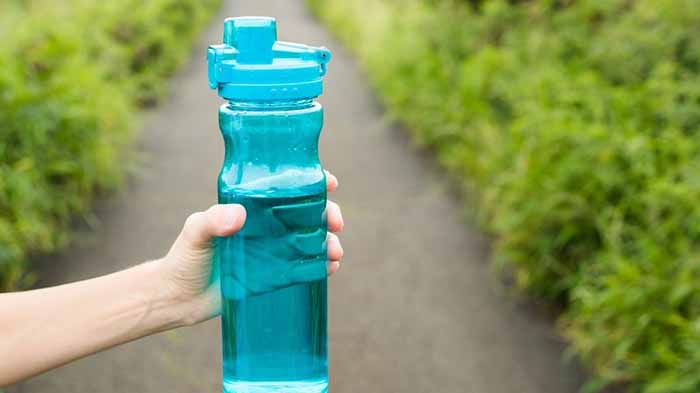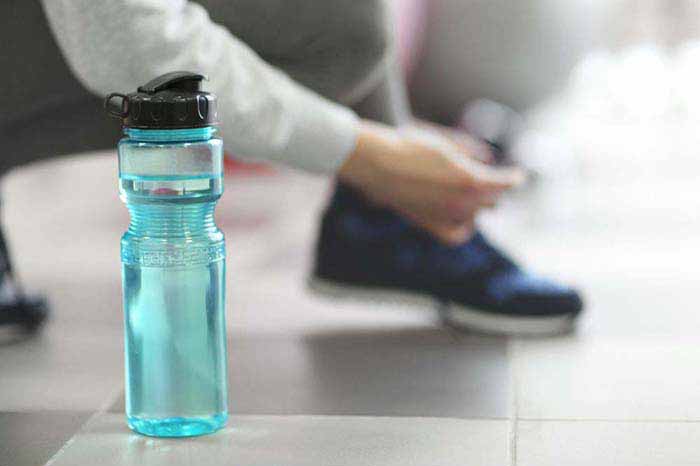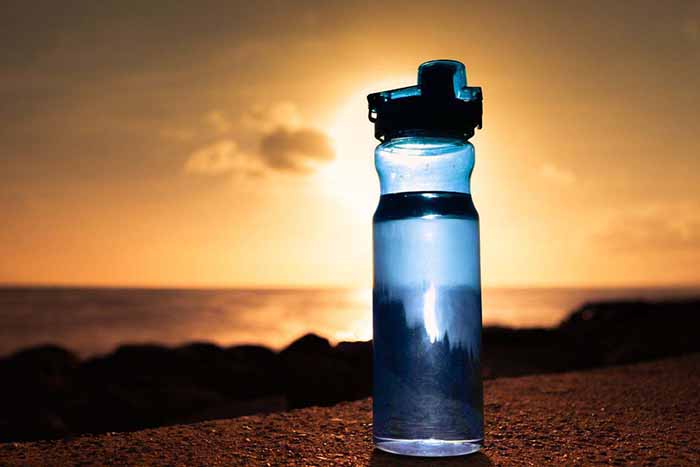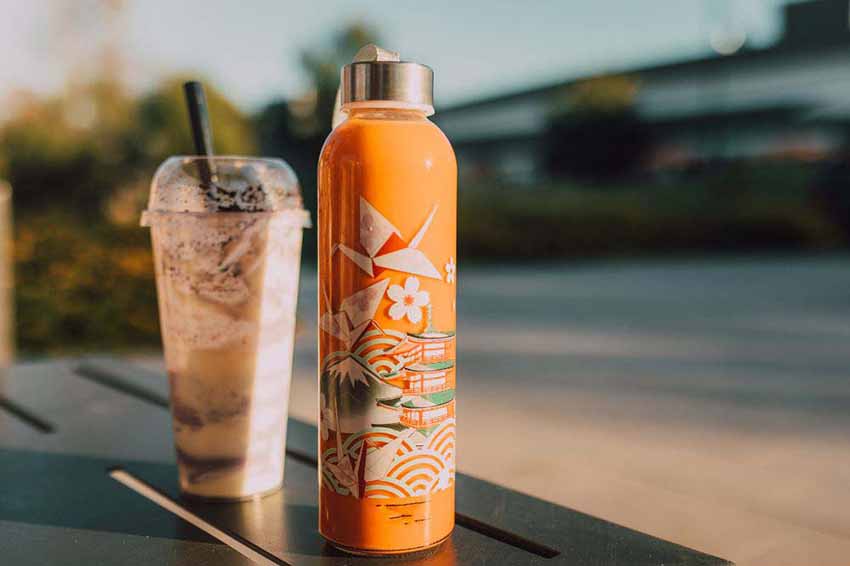Plastic bottles are always more or less under debate. People ask about the environmental impact, health risks, and overall safety of using plastic water bottles. So, is it safe to reuse plastic water bottles?
You can reuse plastic water bottles a couple of times but there are some points to be considered. In this article, we will discuss which type of plastic water bottles are dangerous for you, what the health risks of reusing plastic water bottles are, and how you can reduce the environmental hazards of plastics.
Let’s dive right in!
What Is A Plastic Water Bottle Made Of?
Plastic water bottles are made from various resins and organic compounds, which form synthetic polymers. These bottles carry a recycling code indicating the type of plastic used. Codes range from 1 to 7, which helps in sorting during recycling.

PET (#1 – Polyethylene Terephthalate)
- Most plastic bottles use PET, a type of polyester. Manufacturers design PET bottles for single use, even though the FDA approves them for reuse.
- PET doesn’t contain phthalates or BPA but does include small amounts of aldehyde and antimony. These chemicals can leach into liquids, especially when exposed to heat, like in a hot car.
HDPE (#2 – High-Density Polyethylene)
- Manufacturers use HDPE for larger bottles like gallon-sized water containers and milk jugs. This sturdy plastic resists bacterial growth and withstands heat and sunlight without degrading. HDPE contains nonylphenol, an endocrine disruptor harmful to aquatic life.
- However, HDPE bottles are intended for single use and are widely recycled.
Other Plastics (#7)
- Plastic bottles with the #7 code can be made from various materials, including polycarbonate plastics or epoxy resins. Worth mentioning that these materials contain BPA.
- BPA can leach into the water and has been linked to health issues such as infertility, prostate and breast cancer, and early puberty. It’s best to avoid heating or reusing bottles made from #7 plastics to reduce health risks.
Recommended: Best Materials for Drinking Water Bottle!
Is It Safe to Reuse Plastic Water Bottles?
If you consider environmental benefits, reusing plastic water bottles is a better idea since you reduce waste and save energy. However, it’s a must to be aware of potential health hazards, such as the leaching of chemicals and the release of microplastics.
Here is more information about that.
Microplastic Contamination
A study examined bottled water from various manufacturers across different countries and found that 93% contained microplastics.
Microplastics are tiny plastic particles that can seep into your water from plastic bottles.
Repeatedly opening and closing plastic bottles can cause microplastics (MPs) to be released from the bottleneck and cap areas. Although the inside surfaces of the bottles usually don’t show major cracks, using single-use plastic bottles frequently increases the chance of consuming MPs.
Reusing plastic bottles with codes #1 and #2 is generally safe if you follow some precautions.
Avoid reusing #7 bottles unless you are sure they do not contain BPA. It may be best to avoid using them altogether, even for single use.
Bacteria Growth
Another big problem of reusing plastic water bottles is the chance of bacteria buildup inside the bottles. Avoid reusing plastic bottles if they show any signs of wear and tear, such as dents or cracks, as these can make it easier for germs to enter.
Bacteria can grow fast just from drinking from the bottle. Even if you leave unfinished drinks at room temperature, bacteria can multiply a lot during the day. It’s best to reuse plastic water bottles only occasionally. You also have to wash the bottle thoroughly because germs spread quickly.
Chemical Leaching
Although chemical leaching from plastic water bottles will not necessarily cause cancer, it’s always a good idea to take precautions.
One chemical of concern is BPA, or bisphenol A, which is related to disrupting the endocrine system. It can affect reproduction and metabolism as well. Although PET bottles do not contain BPA, this chemical is found in other plastics like polycarbonate.
Interestingly, one study detected very low levels (5 ng/L) of BPA in water bottled in PET. However, two other studies did not find BPA, which makes the results inconclusive.
Another chemical called antimony is used as a catalyst in PET production. While it is not considered carcinogenic when ingested, it can cause vomiting and diarrhoea.
Remember that heating up plastic water bottles will let the harmful chemicals leach more easily. Avoid exposing plastic bottles to direct sunlight for long periods.
Recommended: How to Choose Reusable Drinking Water Bottles?
When Should You Stop Using A Plastic Water Bottle?
Below are some key signs that indicate it’s time to get rid of your plastic bottle.
- If your plastic water bottle has visible cracks, scratches, or dents, replace it without delay. These imperfections can harbor bacteria and make it easier for chemicals to leach into your drink.
- Over time, plastic bottles can become cloudy or discolored. It’s a clear sign that the plastic is breaking down and could release harmful chemicals into your water.
- Discard plastic bottles if they have been exposed to high temperatures. Heat speeds up the breakdown of plastic, which will increase the risk of chemical leaching.

Plastic Water Bottles Reusing Ideas
You can reuse or repurpose plastic water bottles to avoid landfills and other environmental issues; it’s better than throwing a bottle away every single day. Here are some ideas to help you repurpose these bottles:
Garden Watering System
Create a simple drip irrigation system for your garden with plastic bottles. Drill small holes in the bottle cap and place the bottle upside down near your plants. Fill the bottle with water, which will slowly trickle into the soil and keep your plants hydrated.
Bird Feeder
Transform a plastic bottle into a bird feeder. Cut small holes around the bottle and insert wooden spoons or sticks to create perches. Now, just fill the bottle with birdseed and hang it outside. I love this idea as it provides birds with a place to eat and helps you recycle.
Storage Containers
This is a more common practice. Use plastic bottles to store small items like screws, nails, or craft supplies. Cut the bottle in half and use the bottom part as a container. Another interesting part is that you can use the top part by screwing the cap on and using it as a funnel.
Plastic Bottle Crafts
You can create countless DIY craft projects using plastic bottles. Try making decorative items like flower pots, candle holders, or even jewelry. Paint and decorate the bottles to match your style and add a personal touch to your home décor.

FAQs
1. Do Water Bottles Expire?
Water bottles do not expire, but the plastic can degrade over time. This can affect the taste and safety of your water. Most bottled water has a recommended shelf life of 1-2 years. Store your water bottle in a cool, dark place to maintain quality.
2. What Happens If You Use A Plastic Water Bottle for Too Long?
Using a plastic water bottle for too long can lead to bacterial growth and chemical leaching. Over time, the bottle can develop cracks and scratches, which work as an entrance for germs. Chemicals from the plastic may seep into the water, which is another concern.
Conclusion
Now you have a clear answer to this question- Is it safe to reuse plastic water bottles?
Reusing plastic water bottles comes with health risks. Bacterial growth, chemical leaching, and microplastic release are major concerns. Proper cleaning and careful handling can reduce some risks, but single-use bottles are not designed for long-term use.
Try to switch to reusable bottles that are made from materials like stainless steel or glass. These options are safer, more durable, and better for the environment.

